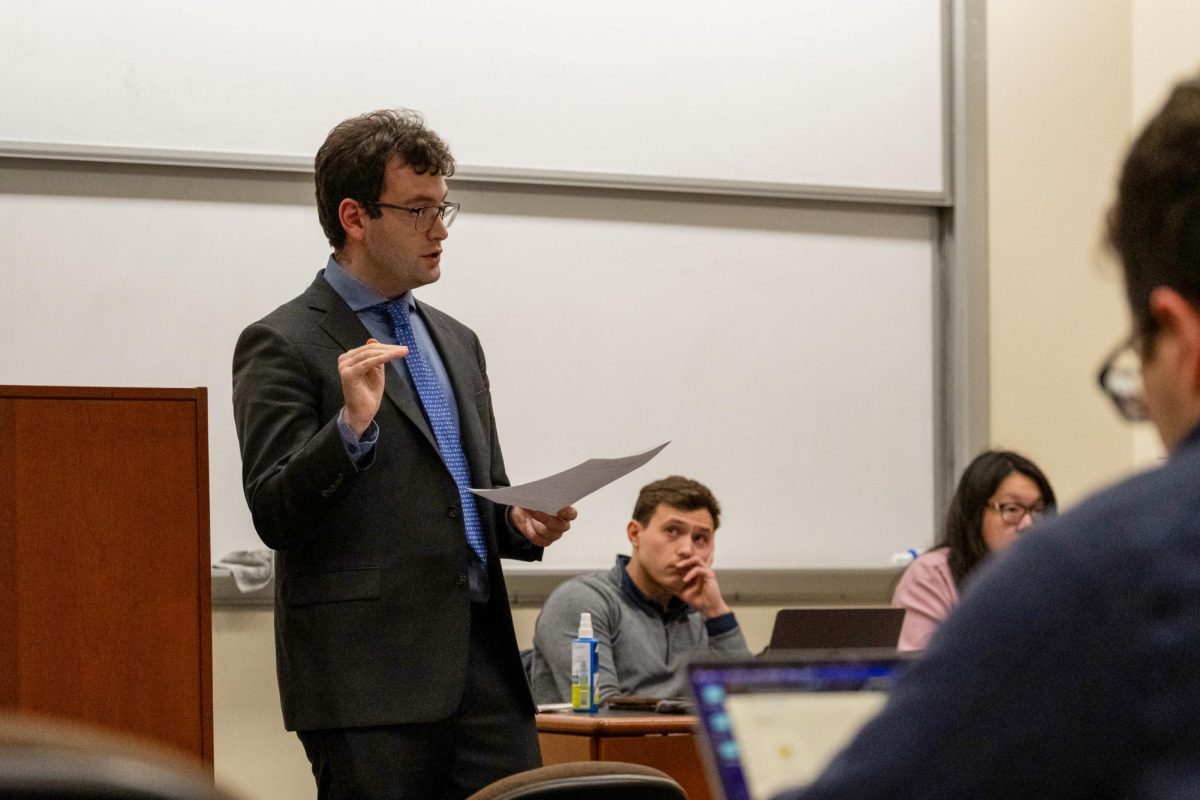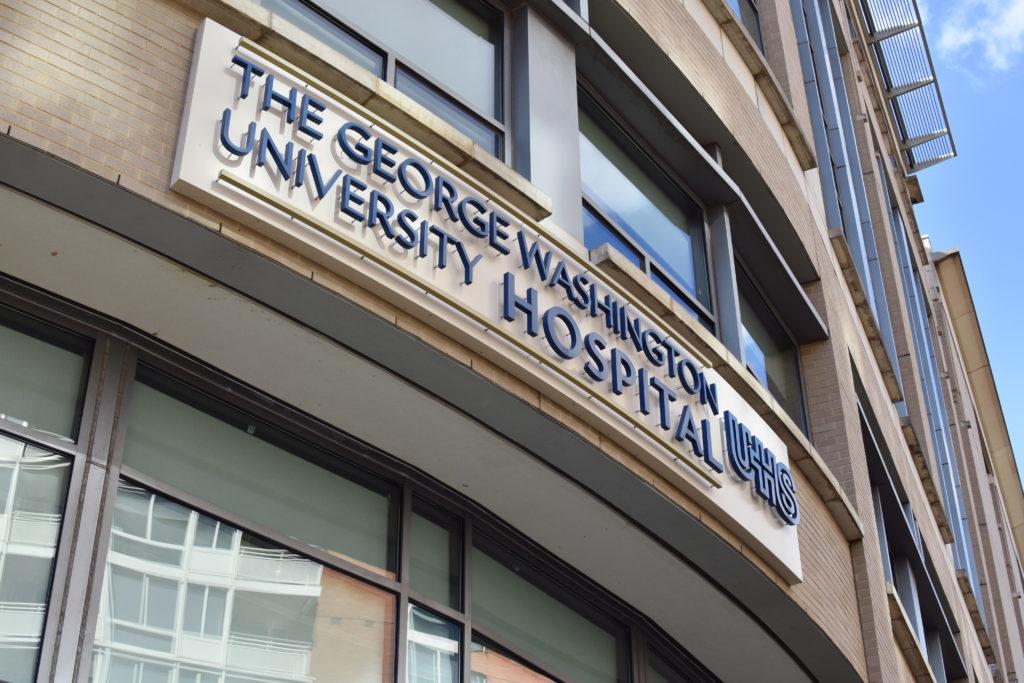Updated: Oct. 25, 2024, at 1:36 p.m.
More than 70 people formed a picket line on the sidewalk stretching between GW Hospital and Ross Hall on Wednesday, demanding the University reach a collective bargaining agreement with residents and fellows at the School of Medicine and Health Sciences.
As they looped between Ross Hall and the hospital, picketers held white plastic hand-clappers, megaphones and signs reading “We can’t afford our own health care,” “Wages should be raised high” and “Health care heroes can’t afford groceries.” SMHS residents and fellows said GW officials have stalled on reaching agreements related to higher wages and mental health care since the two groups initiated contract negotiations in November 2023.
The SMHS residents and fellows overwhelmingly voted to unionize in April 2023 — with 253 voting in favor and 16 against — hoping to improve residents’ salaries and benefits. The rally marks the second time the union has publicly called on GW to accelerate a collective bargaining agreement since starting talks with officials. In April, nearly 300 resident physicians signed a petition urging officials to expedite union negotiations.
“We’re disappointed at the pace of the progress that has been made by the University on our contract proposals,” said Maryssa Miller, a resident physician who helped organize the formation of the union and ongoing unionization efforts.
The picket began at 6 p.m. and lasted two hours. The group of demonstrators — sporting white doctor’s coats and scrubs — swelled to a 100-person peak at about 7 p.m. as the crowd chanted “G-O-T-T-O-G-O union’s busting’s got to go,” “When we fight, we win” and “We put in our 80 hours, now pay up, you broke *ss cowards.”
Miller said it is “the norm” for residents to work more than 80 hours a week, which she said causes burnout and sleep deprivation and increases peoples’ risk for depression. She added that “no one” wants to be taken care of by a doctor that is sleep-deprived or depressed.
A union press release from last week states that some residents make $15 per hour while the hospital faces “chronic” understaffing. The national average salary for first-year residents is about $60,000, according to the American Medical Association.
GW residents earn between $66,628 and $86,903 per year, which officials annually raise to account for employees’ number of years post-graduation, according to the School of Medicine and Health Sciences’ website. Residents can opt into benefits like medical insurance coverage provided by UnitedHealthcare, which includes prescription drug coverage through CVS Caremark, access to Simple Therapy, Castlight, Real Appeal and the Maternity support program.
The release states that physicians struggle to live and work in the area under extreme conditions — often 80 or more hours per week in the fast-paced hospital environment — without mental health benefits, which has “pushed them beyond their breaking points.”
Residents can access mental health and wellness resources like consultations, one-on-one counseling and workshops through the school’s Resiliency & Well-Being Center, according to the its website.
The picket line on Wednesday blocked the entrance to the I Street Mall, including the Foggy Bottom-GWU Metro station. Residents distributed flyers with a QR code linking to a Google Form petition with a letter from the union to University President Ellen Granberg, which people can add their names to, calling on officials to agree to a contract with salary increases and mental health benefits.
“We are members of the George Washington University community, from fellow union members to patients at GWU hospital to D.C. residents, and we are standing in solidarity with the GWU Resident physicians and fellows as they bargain their first union contract,” the letter reads.
Miller said she and other residents and fellows feel that GW officials aren’t taking the union seriously and don’t bring proposals to the bargaining table in a reasonable time frame. She said residents negotiate with Meredith Dante, a lawyer GW hired for negotiations, who “often” says she will bring their proposals back to officials and that she wishes GW’s leaders would attend meetings to speed up the negotiation process.
“We have made some movement in noneconomic proposals, but really haven’t seen the movement we would like from the economic proposal side,” Miller said.
A University spokesperson said GW has continued to engage in good faith negotiations with the union and that University representatives are in “regular communication” with stakeholders to ensure they give “thoughtful consideration” to its proposals. The spokesperson also referenced a website outlining the 24 noneconomic agreements officials made with the union in eight meetings since November 2023, including the grievance procedure, childcare and union payrolls.
The website states that GW officials continue to “review and consider” union proposals and have “responded” on wage, leave and benefits.
Mary Melati, a resident on the union’s bargaining unit, said after the union proposed wage increases again at a contract negotiations meeting earlier this week, GW officials said it was only possible to grant them a 2 or 3 percent increase, which residents said is the “status quo” for how much the hospital already increases wages annually.
She said members of the bargaining unit were also “shocked” that officials weren’t willing to change mental health benefits, especially after William West, an ophthalmology resident, died by suicide in March.
She said at each negotiations meeting, officials join about 15 minutes late and tell union representatives that they “need to think about it.”
“This is the continuation of that frustration finally bubbling over,” Melati said of the picket.
Melati said residents have been considering escalating the fight for a fair contract by organizing protests for the past year, and have executed email campaigns, but she said GW officials “haven’t moved” as a result, prompting the union to organize the picket.
Katelyn Swanson, a pathology resident on the bargaining unit, said residents are “disappointed” with the timeline of negotiations with GW, adding that the picket shows officials that the unit is standing together.
“They need to know that we care, we do,” Swanson said. “We are out here after work. I could be at home with my kid and my husband and I’m not because this is important to me.”
Jason Robart, a third-year anesthesiology resident, said in the release that he hoped the picket would increase community awareness of the taxing conditions residents face when they’re overworked and underpaid.
“There is nothing ‘revolutionary’ about forcing the doctors at the center of care to sacrifice all of ourselves in order to keep the hospital running — this is a toxic culture that we aim to flip on its head,” Robart said.
This post has been updated to clarify the following:
This post has been updated to clarify that fellows can access mental health and wellness resources through the Resiliency & Well-Being Center.





